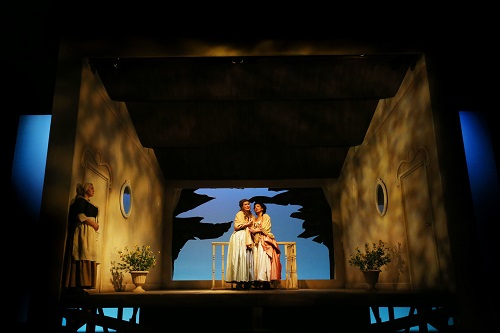 United Kingdom Mozart, Così fan tutte: Soloists, RNCM Opera Orchestra and Chorus / Roger Hamilton (conductor), Royal Northern College of Music. RNCM Theatre, 13.3.2016. (RJF)
United Kingdom Mozart, Così fan tutte: Soloists, RNCM Opera Orchestra and Chorus / Roger Hamilton (conductor), Royal Northern College of Music. RNCM Theatre, 13.3.2016. (RJF)

Mozart, Così fan tutti
Cast
Fiordiligi: Alexandra Lowe
Dorabella: Isabelle Peters
Don Alfonso: Neil Balfour
Guglielmo: Stuart Orme
Ferrando: Alexander Grainger
Despina: Charlotte Trepas
Production
Director: Thomas Guthrie
Set and Costume designer: Rhiannon Newman Brown
Lighting designer: Rachael McCutcheon
Chorus Master: Kevin Thraves
The RNCM opera productions serve a variety of purposes. First they give stage experience to aspiring opera singers. Second they enable the College to showcase exceptional students and help them to be noticed by the people who matter in the UK‘s professional singer ambit.
The last time the RNCM opera school staged Così fan tutte in 1988, it was nearing a kind of watershed in the life of the college’s School of Vocal Studies. Joseph Ward, the founder of the school, and later Head of Vocal Studies, directed it. Among the alumni an outstandingly promising singer named Amanda Roocroft sang Fiordiligi to eulogistic reviews in a production by Joseph Ward himself. It was one of his last productions at the college before retirement. The same year saw a production of Rigoletto by Stefan Janski who followed in 1989 with an admired production of Don Carlos. He has been the College’s regular producer ever since and, as Head of Opera, has regularly directed widely admired productions. He himself retires shortly. The clarity of his productions has been notable, providing excellent opportunity via the double casting of singers for each production as in the pre-Christmas production of Street Scene. The large cast and the doubling allowed many students the opportunity to experience the genre themselves as well as obtaining stage experience, invaluable for them as singers and actors.
Whilst remembering these facts, and how the College mounted a production of Handel’s Alcina in 1989 to further showcase Miss Roocroft, and which also helped launch her on a career that quickly went first national and then international, many supporters of the RNCM have been worried about production values once Stefan Janski has gone. They look around the opera firmament and see the disasters to audience support that arise from producer concepts and so called Regietheater. Many minds were put at rest by this current production by Thomas Guthrie with costume and sets by Rhiannon Newman Brown. We even laughed at the little gimmick of having Despina catch drips of water from the leaking roof of the inner room of the set in a metal bucket, complete with sound effects!
The production was traditional in the best sense with a set that allowed for easy movement and acted interpretations by the singers. Rhiannon Newman Brown’s period costumes and flexible set of a room within the stage proved ideal for the many comings and goings. The forays into the garden by the pairs of lovers were easily accommodated, the necessary ambience aided by good-looking false trees. There were also adequate meaningful and imaginative space and facility for Despina’s changes as she metamorphosed as first doctor and later lawyer.
This, the first of two casts, involved four singers I had heard earlier in the year at the Frederic Cox Award for Singers at the college. The first of those was Alexandra Lowe as Fiordiligi. She sang with strength and acted most convincingly. Whilst admiring her phrasing and word projection in Come scoglio and particularly Pier pietá, I still think her voice would benefit would benefit from work to develop a warmer centre. As the more adventurous of the sisters I admired both the singing and acted portrayal of Isabella Peters who has warmth of tone as well as vibrant and appealing stage presence. Her Act Two aria was particularly well shaped and she and Miss Lowe duetted in a manner that might even have pleased Mozart.
On the male side there was equal vocal strength to that of the ladies. As Ferrando Alexander Grainger’s strong tenor while not being ideally mellifluous for Mozart, exhibited the clarity of his words and phrasing as to indicate significant promise. As Guglielmo, his broken-hearted male counterpart and Cox Award finalist, Stuart Orme showed an impressive range of vocal colour and acted well. However, it was the other two soloists that carried most of the acted burden to keep the action moving. Both had appeared in the Frederic Cox Award earlier on the year. Neil Balfour didn’t over-egg Alfonso’s machinations, nicely portraying inveigling Despina into joining in his plan when it looked as it might flounder. But it was Charlotte Trepas, the winner of the Cox Award, who carried the singer actor laurels as she manipulated her mistresses’ bosses and so superbly portrayed the doctor who cured the lovers and the lawyer who supervised the supposed marriage of the sisters to the newly arrived visitors from Albania. This was not easy to bring off, nor to sing, but Miss Trespas achieved the portrayal with aplomb to match her smooth and characterful singing.
All in all, the full RNCM Opera Theatre audience were very happy with what they had both seen and heard and showed warm appreciation at the conclusion of one of the more difficult of Mozart’s operas to bring off. Well done all round.
Robert J Farr